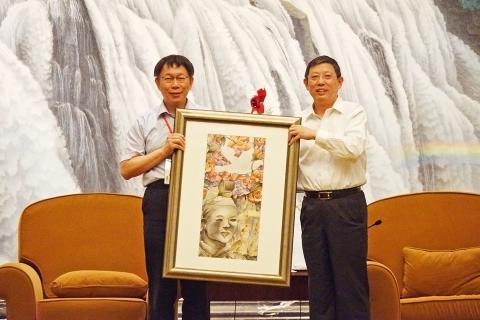Taipei Mayor Ko Wen-je (柯文哲) yesterday told Shanghai Mayor Yang Xiong (楊雄) that he hoped increased participation in this year’s Taipei-Shanghai forum would help both sides of the Taiwan Strait boost interactions, goodwill and mutual trust.
Ko, who arrived in Shanghai earlier yesterday for the Taipei-Shanghai City Forum, made the remarks during his meeting with Yang, where the two exchanged pleasantries and souvenirs.
The nearly 100 businesspeople in the 130-strong Taipei delegation are scheduled to exchange opinions about culture, smart city infrastructure, youth entrepreneurship and healthcare systems within communities with their Chinese counterparts today at the Ruijin Hotel Shanghai, the forum’s venue.

Photo: CNA
Yang touted Shanghai and Taipei as the first two cities to have carried out exchanges across the Taiwan Strait, including the annual forum, which he said has led to remarkable outcomes. In return, Ko expressed his gratitude to the Shanghai City Government for hosting the event.
Ko presented Yang with a souvenir, a painting by Taipei Municipal Bailing Senior High School student Hsu En-chi (許恩綺), which features a white pigeon and a Qin Dynasty terra-cotta soldier, juxtaposing the concepts of peace and war.
In return, Yang presented Ko with a painted ceramic dish.
Yang referred to Ko as “Mayor Ko of Taipei,” avoiding a concern among local media outlets that China would try to undermine Taiwan’s sovereignty by addressing Ko in an inappropriate manner.
In response to reporters’ questions prior to his departure, Ko said he would seek to establish mutual trust across the Taiwan Strait.
“Without mutual trust, both sides are always on guard against each other. This slows things down, resulting in low efficiency,” he said.
Ko also brushed aside criticism by Taipei City Councilor Wang Shih-chien (王世堅) of the Democratic Progressive Party, who said that members of the delegation were “Ko Dynasty nouveaux riches,” using Universal Eye Center president Lin Pi-jung (林丕容) as an example.
In response, Ko said that Lin was his sole appointment to the delegation.
On Sunday evening, Wang told the Chinese-language Liberty Times (the Taipei Times’ sister newspaper) that Ko was apparently taking Lin, his National Taiwan University classmate, on the trip so that Lin could “establish business ties” in China, similar to methods employed by the Chinese Nationalist Party (KMT).
He lambasted Ko’s move, saying that private-sector delegates selected by the Taipei City Government are “parvenus” of the “Ko Dynasty.”
Ko said that, with the exception of Lin, who also doubles as the chairman of online shopping outlet books.com.tw, all delegates were appointed by the conveners of four sub-forums scheduled to open in Shanghai today.
“The only exception is Lin Pi-jung, my college classmate. We are quite close. Considering that he has a business in Shanghai and that he knows his way around, I specifically put him on the delegation,” he said.

CHAOS: Iranians took to the streets playing celebratory music after reports of Khamenei’s death on Saturday, while mourners also gathered in Tehran yesterday Iranian Supreme Leader Ayatollah Ali Khamenei was killed in a major attack on Iran launched by Israel and the US, throwing the future of the Islamic republic into doubt and raising the risk of regional instability. Iranian state television and the state-run IRNA news agency announced the 86-year-old’s death early yesterday. US President Donald Trump said it gave Iranians their “greatest chance” to “take back” their country. The announcements came after a joint US and Israeli aerial bombardment that targeted Iranian military and governmental sites. Trump said the “heavy and pinpoint bombing” would continue through the week or as long

TRUST: The KMT said it respected the US’ timing and considerations, and hoped it would continue to honor its commitments to helping Taiwan bolster its defenses and deterrence US President Donald Trump is delaying a multibillion-dollar arms sale to Taiwan to ensure his visit to Beijing is successful, a New York Times report said. The weapons sales package has stalled in the US Department of State, the report said, citing US officials it did not identify. The White House has told agencies not to push forward ahead of Trump’s meeting with Chinese President Xi Jinping (習近平), it said. The two last month held a phone call to discuss trade and geopolitical flashpoints ahead of the summit. Xi raised the Taiwan issue and urged the US to handle arms sales to

BIG SPENDERS: Foreign investors bought the most Taiwan equities since 2005, signaling confidence that an AI boom would continue to benefit chipmakers Taiwan Semiconductor Manufacturing Co’s (TSMC, 台積電) market capitalization swelled to US$2 trillion for the first time following a 4.25 percent rally in its American depositary receipts (ADR) overnight, putting the world’s biggest contract chipmaker sixth on the list of the world’s biggest companies by market capitalization, just behind Amazon.com Inc. The site CompaniesMarketcap.com ranked TSMC ahead of Saudi Aramco and Meta Platforms Inc. The Taiwanese company’s ADRs on Tuesday surged to US$385.75 on the New York Stock Exchange, as strong demand for artificial intelligence (AI) applications led to chip supply constraints and boost revenue growth to record-breaking levels. Each TSMC ADR represents

State-run CPC Corp, Taiwan (CPC, 台灣中油) yesterday said that it had confirmed on Saturday night with its liquefied natural gas (LNG) and crude oil suppliers that shipments are proceeding as scheduled and that domestic supplies remain unaffected. The CPC yesterday announced the gasoline and diesel prices will rise by NT$0.2 and NT$0.4 per liter, respectively, starting Monday, citing Middle East tensions and blizzards in the eastern United States. CPC also iterated it has been reducing the proportion of crude oil imports from the Middle East and diversifying its supply sources in the past few years in response to geopolitical risks, expanding